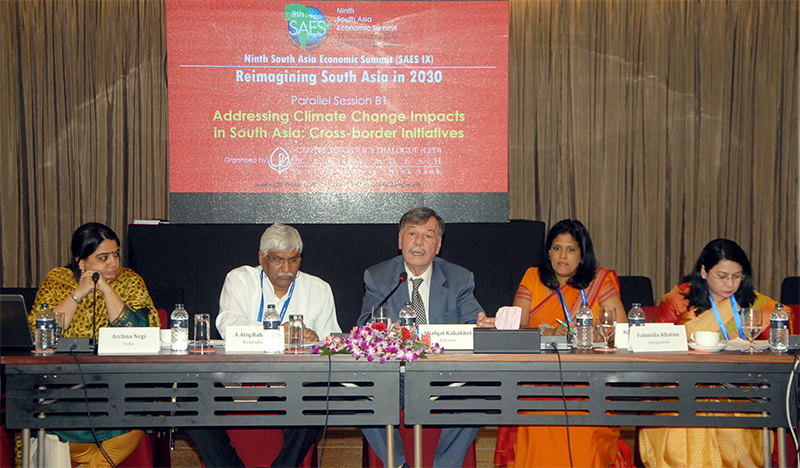
South Asian countries need to work together in a more integrated manner to turn the region into a dynamic and prosperous one. Political leaderships in the region need to concentrate on implementing the 2030 Agenda for Sustainable Development endorsed by the United Nations. Experts and policymakers gathered at the Ninth South Asia Economic Summit (SAES IX) stressed on collective effort of the South Asian countries towards making energy available for all on a sustainable basis, dealing with climate change, reducing inequality and gender discrimination, fostering connectivity, promoting industrialisation, financing development, ensuring inclusiveness, and utilising media for branding regional identity. These recommendations came from the nine parallel sessions on the second day of the SAES IX. The event was organised by the Centre for Policy Dialogue (CPD) on 15-16 October 2016 at Hotel Le Méridien Dhaka, Bangladesh.
There were nine parallel sessions in this event. Parallel Session A1 titled Achieving Sustainable Energy for All in South Asia: Modalities of Cooperation was chaired by Ambassador Farooq Sobhan, President, Bangladesh Enterprise Institute (BEI). Mr Kohji Iwakami, Economic Affairs Officer, Energy Division, UNESCAP, Bangkok; Dr Mahendra P Lama, Professor, Centre for South Asian Studies, School of International Studies, Jawaharlal Nehru University, India; Mr Nitya Nanda, Fellow, Centre for Global Agreements, Legislation and Trade, The Energy and Resources Institute (TERI), India; Mr Pramod Rijal, Economist, Institute for Integrated Development Studies (IIDS), Nepal; and Mr Alias Wardak, Secretary General, New Beginning Network (NBN), Afghanistan were present at the session as Panellists.
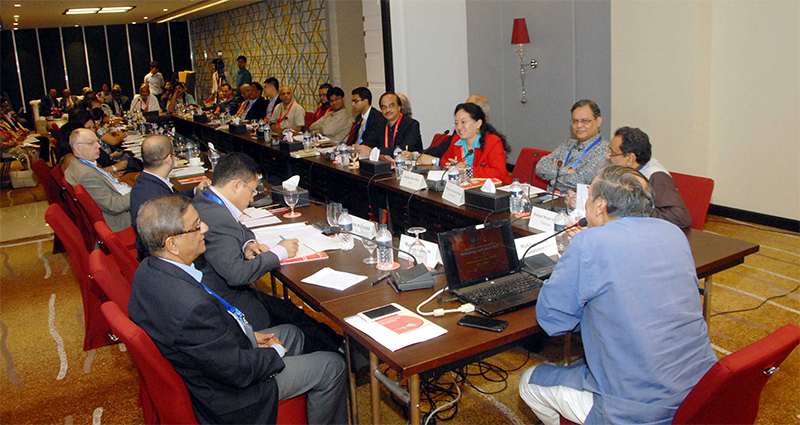
Mr Mahfuz Anam, Editor, the Daily Star, Bangladesh chaired the Parallel Session A2 titled Promoting South Asian Identity: Role of Media. Mr Shafqat Munir Ahmad, Founding Editor, Infochange News and Features Network (INFN), Pakistan; Mr Monjurul Ahsan Bulbul, Editor in Chief and CEO, Ekushey TV, Bangladesh; Mr Matiur Rahman, Editor, the Daily Prothom Alo, Bangladesh; Ms Shobha Shrestha, Senior News Editor/Presenter/Reporter, Nepal Television; and Mr Rinzin Wangchuk, Editor, Kuensel Corporation Ltd., Bhutan spoke at the session as Panellists.
The title of the Parallel Session A3 was Financing Development in South Asia: Avenues and Institutional Arrangements. Dr A B Mirza Azizul Islam, Former Advisor to the Caretaker Government, Ministries of Finance and Planning, Bangladesh chaired this session. Dr Salehuddin Ahmed, Former Governor, Bangladesh Bank; Dr Priyadarshi Dash, Research Associate, Research and Information System for Developing Countries (RIS), India; Dr Sreeradha Dutta, Director, Maulana Abul Kalam Azad Institute of Asian Studies (MAKAIAS), India; Mr Asif Ibrahim, Former President, Dhaka Chamber of Commerce and Industry (DCCI), Bangladesh; Dr Selim Raihan, Professor, Department of Economics, University of Dhaka, Bangladesh; and Ms Saadiya Razzaq, Senior Research Associate, Sustainable Development Policy Institute (SDPI), Pakistan were the Panellists in this session.
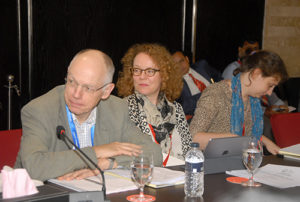 Parallel Session B1 titled Addressing Climate Change Impacts in South Asia: Cross-border Initiatives was chaired by Ambassador Shafqat Kakakhel, Chair, Board of Governors, SDPI. Ms Karin Fernando, Senior Research Professional, Centre for Poverty Analysis (CEPA), Sri Lanka; Dr Fahmida Khatun, Research Director, CPD; Dr Archna Negi, Associate Professor, Centre for International Politics, Organization and Disarmament, School of International Studies, Jawaharlal Nehru University, India and Dr A Atiq Rahman, Executive Director, Bangladesh Centre for Advanced Studies (BCAS) spoke as Panellists at this session.
Parallel Session B1 titled Addressing Climate Change Impacts in South Asia: Cross-border Initiatives was chaired by Ambassador Shafqat Kakakhel, Chair, Board of Governors, SDPI. Ms Karin Fernando, Senior Research Professional, Centre for Poverty Analysis (CEPA), Sri Lanka; Dr Fahmida Khatun, Research Director, CPD; Dr Archna Negi, Associate Professor, Centre for International Politics, Organization and Disarmament, School of International Studies, Jawaharlal Nehru University, India and Dr A Atiq Rahman, Executive Director, Bangladesh Centre for Advanced Studies (BCAS) spoke as Panellists at this session.
Mr M Syeduzzaman, Member, CPD Board of Trustees, Bangladesh chaired the Parallel Session B2 titled Reducing Inequality in South Asia: Critical Issues and Policy Choices. Professor Abdul Wassay Haqiqi, CEO, Silk Road Innovation Group, Afghanistan; Engr M A Jabbar, Member, Board of Governors, SDPI; Dr Simrit Kaur, Professor of Public Policy, Faculty of Management Studies, University of Delhi, India; Dr K A S Murshid, Director General, Bangladesh Institute of Development Studies (BIDS); Professor Bishwambher Pyakuryal, President, Nepal Economic Association; and Dr Ganga Tilakaratna, Research Fellow, Institute of Policy Studies of Sri Lanka (IPS) attended the session as Panellists.
The title of the Parallel Session B3 was Fostering Connectivity and Economic Integration in South Asia: Role of Private Sector. The session was chaired by Mr Abdul Matlub Ahmad, President, Federation of Bangladesh Chambers of Commerce and Industry (FBCCI). Ms Saroj Ayush, Consultant, UNESCAP South and South-West Asia Office, India; Dr Prabir De, Professor, RIS; Mr Sarath Kahapalarachchi, President, Federation of Chambers of Commerce and Industry of Sri Lanka (FCCISL); Mr Pranav Kumar, Director & Head, International Trade Policy, Confederation of Indian Industry (CII), India; Mr Ahmad Shah Mobariz, Research Board Member, Porsesh Research and Studies Organization (PRSO), Afghanistan; and Mr Rabi S Sainju, Joint Secretary, Ministry of Commerce, Nepal addressed the session as Panellists.
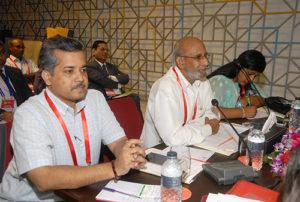 Professor Arif Waqif, Director, School of Management & Training, Jawaharlal Nehru Institute of Advanced Studies, India chaired the Parallel Session C1 titled Promoting Sustainable Industrialisation: Opportunities for Job Creation and Income Generation. Mr Kithmina Hewage, Research Assistant, IPS; Ms Franziska Korn, Resident Representative, Friedrich-Ebert-Stiftung (FES), Bangladesh Office; Mr Syed Nasim Manzur, President, Metropolitan Chamber of Commerce and Industry (MCCI), Bangladesh; Mr Udai Singh Mehta, Deputy Executive Director, CUTS International, India; Dr Khondaker Golam Moazzem, Additional Research Director; CPD; and Mr Syed A Al-Muti, Acting Director, Economic Development, The Asia Foundation, Bangladesh were present as Panellists at this session.
Professor Arif Waqif, Director, School of Management & Training, Jawaharlal Nehru Institute of Advanced Studies, India chaired the Parallel Session C1 titled Promoting Sustainable Industrialisation: Opportunities for Job Creation and Income Generation. Mr Kithmina Hewage, Research Assistant, IPS; Ms Franziska Korn, Resident Representative, Friedrich-Ebert-Stiftung (FES), Bangladesh Office; Mr Syed Nasim Manzur, President, Metropolitan Chamber of Commerce and Industry (MCCI), Bangladesh; Mr Udai Singh Mehta, Deputy Executive Director, CUTS International, India; Dr Khondaker Golam Moazzem, Additional Research Director; CPD; and Mr Syed A Al-Muti, Acting Director, Economic Development, The Asia Foundation, Bangladesh were present as Panellists at this session.
Parallel Session C2 titled Building Accountable and Inclusive Institutions in South Asia was chaired by Professor Rounaq Jahan, Distinguished Fellow, CPD. Mr Indrajith Aponsu, Senior Lecturer, Department of Economics, University of Colombo, Sri Lanka; Dr Abraham George, Director & Professor, Institute for Sustainable Development and Governance (ISDG), India; Mr Rameshore Khanal, Chief Economic Adviser to the Prime Minister of Nepal; Dr Ahsan Habib Mansur, Executive Director, Policy Research Institute of Bangladesh (PRI); Mr Ibrahim Shareef Mohamed, Commissioner General of Customs; Maldives Customs Service participated at this session as Panellists.
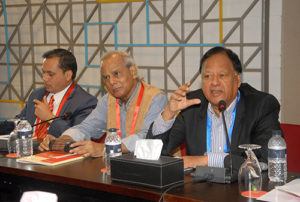 The title of the Parallel Session C3 was Deepening an Inclusive South Asian Integration through Gender-sensitive Trade Policies. Dr Dilli Raj Khanal, Founder Chairman, Institute for Policy Research and Development (IPRAD), Nepal chaired this session. Dr Martin Rama, Chief Economist for South Asia, The World Bank, New Delhi; Dr Shahid Ahmed, Professor & Head, Department of Economics, Jamia Millia Islamia, India; Dr Amita Batra, Professor, Centre for South Asian Studies; Jawaharlal Nehru University, India; Ms Suwendrani Jayaratna, Research Officer, IPS;; Dr Mohammad A. Razzaque, Adviser & Head, International Trade Policy, The Commonwealth, London; Ms Dikshya Singh, Research Officer, South Asia Watch on Trade, Economics and Environment (SAWTEE), Nepal; Ms Aishath-Raniya Sobir, Research Associate, TANGO International, Thailand; and Dr Janaka Wijayasiri, Research Fellow, IPS, Sri Lanka participated as Pannellists at this session.
The title of the Parallel Session C3 was Deepening an Inclusive South Asian Integration through Gender-sensitive Trade Policies. Dr Dilli Raj Khanal, Founder Chairman, Institute for Policy Research and Development (IPRAD), Nepal chaired this session. Dr Martin Rama, Chief Economist for South Asia, The World Bank, New Delhi; Dr Shahid Ahmed, Professor & Head, Department of Economics, Jamia Millia Islamia, India; Dr Amita Batra, Professor, Centre for South Asian Studies; Jawaharlal Nehru University, India; Ms Suwendrani Jayaratna, Research Officer, IPS;; Dr Mohammad A. Razzaque, Adviser & Head, International Trade Policy, The Commonwealth, London; Ms Dikshya Singh, Research Officer, South Asia Watch on Trade, Economics and Environment (SAWTEE), Nepal; Ms Aishath-Raniya Sobir, Research Associate, TANGO International, Thailand; and Dr Janaka Wijayasiri, Research Fellow, IPS, Sri Lanka participated as Pannellists at this session.
Co-organisers of this Summit are IPS, RIS, SAWTEE and SDPI.


